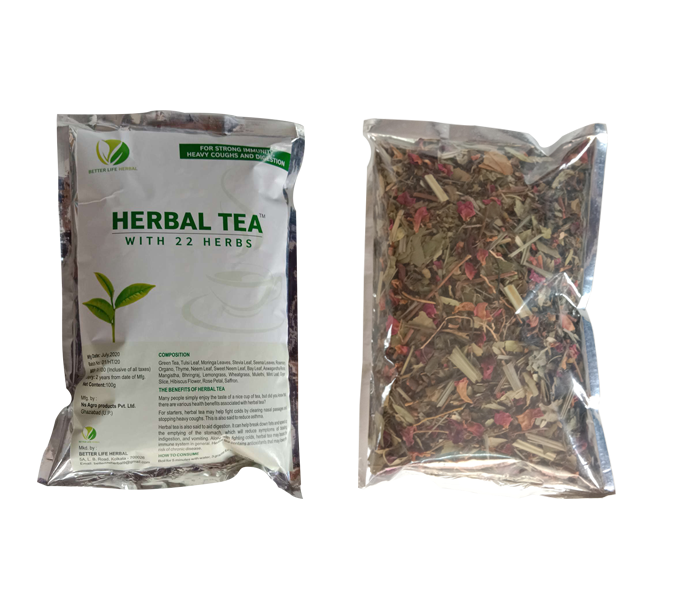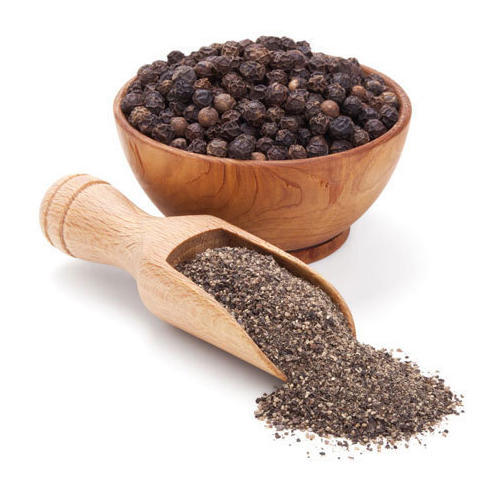
Many people simply enjoy the taste of a nice cup of tea, but did you know that there are various health benefits associated with herbal tea? For starters, herbal tea may help fight colds by clearing nasal passages and stopping heavy coughs. This is also said to reduce asthma.
Herbal tea is also said to aid digestion. It can help break down fats and speed up the emptying of the stomach, which will reduce symptoms of bloating, indigestion, and vomiting. The best teas for this are peppermint, dandelion, chamomile, and ginger.
Along with fighting colds, herbal tea may boost the immune system in general. Herbal tea contains antioxidants that may lower the risk of chronic disease.

1. Healing Power: The tulsi plant has many medicinal properties. The leaves are a nerve tonic and also sharpen memory. They promote the removal of the catarrhal matter and phlegm from the bronchial tubes. The leaves strengthen the stomach and induce copious perspiration. The seeds of the plant are mucilaginous, producing a coating that protects mucus membranes.
2. Fever & Common Cold: The leaves of basil are a specific cure for many fevers. During the rainy season, when malaria and dengue fever are widely prevalent, tender leaves boiled with tea act as preventive against these diseases. In case of acute fevers, an extraction of the leaves boiled with powdered cardamom in half a liter of water and mixed with sugar and milk brings down the temperature. The juice of tulsi leaves can be used to bring down fever. Extract of tulsi leaves in fresh water should be given every 2 to 3 hours. In between one can keep giving sips of cold water. In children, it is every effective in bringing down the temperature.
3. Coughs: Tulsi is an important constituent of many Ayurvedic cough syrups and expectorants. It helps to mobilize mucus in bronchitis and asthma. Chewing tulsi leaves relieves cold and flu.
4. Sore Throat: Water boiled with basil leaves can be taken as drink in case of sore throat. This water can also be used as a gargle.
5. Respiratory Disorder: The herb is useful in the treatment of respiratory system disorder. An extraction of the leaves mixed with honey and ginger is an effective remedy for bronchitis, asthma, influenza, cough and cold. An extraction of the leaves mixed with cloves and common salt also gives immediate relief in case of influenza. They should be boiled in half a liter of water till only half the water is left and add then taken.
6. Kidney Stone: Basil has strengthening effect on the kidneys. In case of kidney stones, the juice of basil leaves and honey, if taken regularly for 6 months, it will expel them via the urinary tract.
7. Heart Disorder: Basil has a beneficial effect in cardiac disease and the weakness resulting from them. It reduces the level of blood cholesterol.
8. Children's Ailments: Common pediatric problems such as cough, cold, fever, diarrhea and vomiting respond favorably to the juice of basil leaves. If pustules of chicken pox delay their appearance, basil leaves taken with saffron will hasten them.
9. Stress: Basil leaves are regarded as an 'adaptogen' or anti-stress agent. Recent studies have shown that the leaves afford significant protection against stress. Even healthy persons can chew 12 leaves of basil, twice a day, to prevent stress. It purifies blood and helps prevent several common elements
10. Mouth Infections: The leaves are quite effective for ulcers and infections in the mouth. A few leaves chewed will cure these conditions.
11. Insect Bites: The herb is a prophylactic or preventive, as well as a curative for insect stings or bites. A teaspoonful of the juice of the leaves is taken and is repeated after a few hours. Fresh juice must also be applied to the affected parts. A paste of fresh roots is also effective in case of bites of insects and leeches.
12. Skin Disorders: Applied locally, basil juice is beneficial in the treatment of ringworm and other skin diseases. It has also been tried successfully by some naturopaths in the treatment of leucoderma.
13. Teeth Disorder:The herb is useful in teeth disorders. Its leaves, dried in the sun and powdered, can be used for brushing teeth. It can also be mixed with mustered oil to make a paste and used as toothpaste. This is very good for maintaining dental health, counteracting bad breath and for massaging the gums. It is also useful for pyorrhea and other teeth disorders
14. Headaches: Basil makes a good medicine for headache. An extraction from the leaves can be given for this disorder. Pounded leaves mixed with sandalwood paste can also be applied on the forehead for getting relief from heat, headache, and for providing coolness in general.
15. Eye Disorders: Basil juice is an effective remedy for eye disorders such as sore eyes and night-blindness, which is generally caused by deficiency of vitamin A. Two drops of black basil juice are put into the eyes daily at bed time.

Do any of these common symptoms sound familiar?
The use of ashwagandha can work as an herbal medicine to help alleviate these symptoms and support a boost in energy levels and a rejuvenating sense of well-being.
Ashwagandha Benefits and Healing EffectsAshwagandha contains many useful medicinal chemicals, including withanolides (steroidal lactones), alkaloids, choline, fatty acids, amino acids, and a variety of sugars. While the leaves and fruit have valuable therapeutic properties, the organic ashwagandha root of the ashwagandha plant is the part most commonly used for treatment in Western herbal medicine remedies because of the effects of ashwagandha are manifold.
Medical researchers have been studying ashwagandha for years with great interest and have completed more than 200 studies on the healing benefits of this botanical. Some key examples of Ashwagandha health benefits are:
In Ayurveda, there are specific herbs with adaptogenic benefits—ashwagandha is one of them. Adaptogens are substances (a combination of amino acids, vitamins, and herbs) that modulate your stress response or reaction to a changing environment. Adaptogens help the body cope with external stresses such as toxins in the environment and internal stresses such as anxiety and insomnia, or any stress-related disorders.
How to Add Ashwagandha to Your Daily DietAccording to Ayurveda, our bodies are woven from food. The nutrients we ingest are metabolized into the energy and information that form our cells, tissues, and organs. Every day our bodies need essential vitamins, minerals, and other nutrients to maintain our body’s delicate balance.
Ashwagandha is classically taken as a fine powder mixed in honey or ghee. In western countries, it typically ingested in capsule form.

Amalaki is commonly used to promote longevity in Ayurveda. It's also used by Ayurvedic practitioners to improve the health of the blood, bones, digestive system, liver, and skin.
Additionally, Amalaki is said to possess cooling properties that can help soothe pitta (one of the three doshas). According to the principles of Ayurveda, excess pitta can contribute to inflammation, difficulty sleeping, skin problems, gastrointestinal disorders, and stress-related issues such as high blood pressure.
In addition, Amalaki is thought to reduce inflammation, alleviate pain, promote detox, sharpen memory, and protect against cancer.
Benefits
Despite its long history of use in Ayurvedic medicine, Amalaki, and its health effects have been tested in few scientific studies. However, some preliminary research suggests that Amalaki may offer certain health benefits. Here's a look at some key findings from the available studies on
Amalaki:

As with a lot of herbal medicine, more research is needed to better understand and prove uses for ginger and ginger water. There are many anecdotes about uses for ginger water that can’t be guaranteed healthy or effective. However, there are several potential benefits backed by limited research.
Inflammation is one of your body’s natural self-preservation functions. Germs, chemicals, and poor diet can cause too much inflammation and harm your body.
Inflammation has become a very common experience for a lot of people. Diet and lifestyle changes may be necessary to fight chronic inflammation.
Consuming ginger may help prevent and heal inflammation. Ginger could reduce allergic reactions, in which inflammation can play a role.
who took daily ginger supplements had less muscle pain after working out. Muscle pain can be caused by inflammation.
The antioxidant properties of ginger may help to prevent:
Antioxidants fight reactive oxygen species (ROS), which cause oxidative stress and damage your cells. Your body naturally makes ROS, but some lifestyle choices, like drinking large quantities of alcohol, smoking, or experiencing chronic stress can make you produce too much ROS. Consuming foods and drinks with antioxidants, like ginger water, can help prevent and fight the negative side effects of ROS.
It found that ginger could prevent or slow down kidney failure. Ginger may also slow the growth of tumors, and found evidence that ginger may help control some types of cancer
Cultures around the world regularly take ginger to help ease indigestion, vomiting, and nausea. Studies are inconclusive as to how effective this is.
It found that ginger improved fasting blood sugar in people with diabetes. These and other findings show promise that ginger can help treat health concerns caused by chronic diabetes.
A recent study showed that ginger reduced heart disease markers like arginase activity, LDL (“bad”) cholesterol, and triglycerides in rats give a high-fat diet.
Ginger water may help promote weight loss when combined with a healthy diet and exercise. It showed that ginger suppressed obesity in rats on high-fat diets. And another study found that men who drank a hot ginger beverage after eating felt more full for longer. Balanced blood sugar can also prevent you from overeating.

Benefits:
According to Nutritionist raw turmeric can help boost digestion. Curcumin is said to trigger bile production, which is one of the main components of digestion. Increased secretion of bile juice helps facilitate smoother digestion through the tracts.
The star compound curcumin can put most of your tummy woes to rest. Raw turmeric may stave off indigestion and heartburn and provide relief from symptoms like irritable bowel syndrome. Experts say that consumption of raw turmeric may also help treat stomach ulcers and irritation.
Raw turmeric is packed with anti-inflammatory properties, which helps relieving symptoms associated with both Rheumatoid arthritis and osteoarthritis, says consultant Nutritionist .Turmeric can also be used to treat inflammation caused due to eye infections.
"The antioxidants present in raw turmeric can help curb the free radical activity, which can boost skin health." Doctor says, "Using raw haldi is one of the oldest and traditional ways to cure a variety of skin ailments. It is also known to cure skin problems caused dues to air pollution."
Kacchi Haldi could be a perfect ointment to any kind of cuts or injuries. Curcumin, the therapeutic component of turmeric is packed with anti-inflammatory, anti-bacterial and anti-viral properties which boosts healing. "The curcumin present in raw turmeric is renowned for its excellent antiseptic properties", says Doctor
Raw haldi's incredible anti-inflammatory properties makes it an excellent pain reliever. "You can have it with warm milk and your pain would begin to recede almost immediately," says Doctor."It can be applied in paste form on affected area or consumed with milk for best effects."
Raw turmeric can also help eliminating toxins from blood. "Several studies and experts have identified raw turmeric's role in purifying blood. It also regulates blood clot formation.
Maintains blood sugar problem Raw turmeric has been known to regulate blood sugar levels too. Diabetics can load up on the wonder spice to monitor the insulin levels.

1. Black pepper is rich in a potent antioxidant called piperine, which may help prevent free radical damage to your cells.
2. Black pepper contains an active compound that has been shown to decrease inflammation in animals. Still, it’s unclear whether it has the same effects in humans.
3. Black pepper extract has improved symptoms of degenerative brain diseases in animal studies, but studies in humans are needed to verify these results.
4. Black pepper extract may improve blood sugar control, but more research is needed.
5. Black pepper has demonstrated cholesterol-lowering effects in rodent studies and is believed to boost the absorption of potential cholesterol-lowering supplements.
6. . Black pepper contains an active compound that has slowed the replication of cancer cells and induced cancer cell death in test-tube studies. However, these effects have not been studied in people.
7. . Black pepper increases the absorption of essential nutrients and beneficial plant compounds. According to preliminary research, it may also promote gut health, offer pain relief, and reduce appetite
8. Black pepper has a subtle heat and a bold flavor that makes it a tasty addition to almost any dish.
Copyright © 2020 better life herbal All rights reserved.